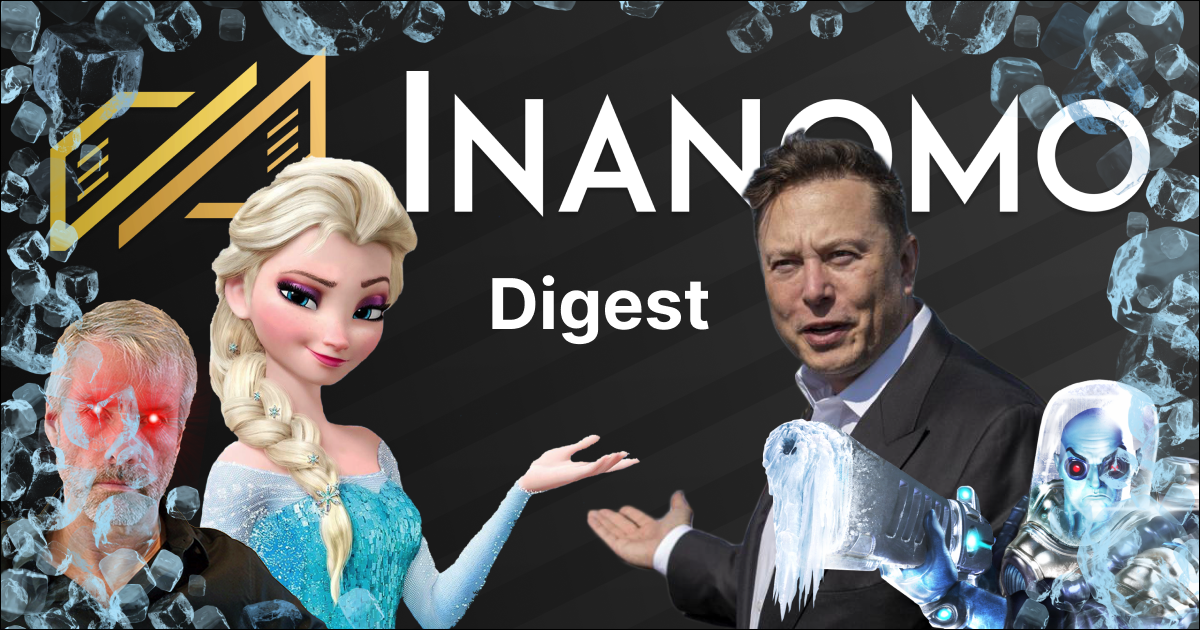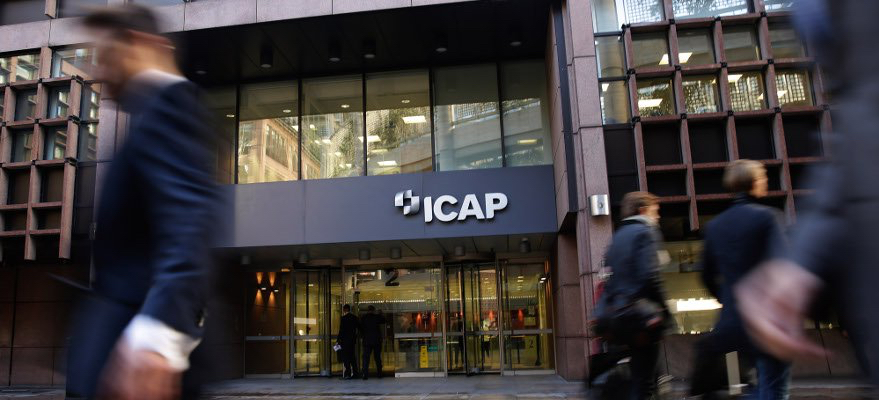
Here comes December. Probably, it's time to talk about "Cryptowinter". I remember well how the first one started. And especially, I remember well a couple of years of calm in the crypto industry. From the very beginning of 2018 to Covidgeddon in 2020. But in the summer of 2019, an event occurred that we all should remember together.

The largest inter-dealer broker TP ICAP, founded in 1971 in London, entered the bitcoin derivatives market. The company has made it possible for customers to buy and sell bitcoin futures through the Chicago Mercantile Exchange (CME).
TP ICAP also added support for Bitcoin-based settlement forwards, making them available to residents of the US and Asia soon. In addition, the firm was considering adding the ability to support trading in altcoins and tokenized assets in the future (remember this statement).
“We want to get closer to what is happening with this emerging asset class as we believe it is important to invest in the early stages of a growing market,” said ICAP in June 2019.
And on the first day of winter 2022, it became known that TP ICAP registered the company of Fusion Digital Assets crypto-broker for institutionals in Britain!
“Until now, the wholesale digital asset market lacked the robust infrastructure and guarantees needed [by financial market participants] to allocate capital,” Duncan Trenholm, Co-Head of Digital Assets at TP ICAP Group as early as 2022, said in a statement. “We believe that, over time, blockchain will lead to the tokenization of traditional asset classes.”
Nice and timely move. After all, as I said in one of the first issues - "If you can’t win - lead." Especially according to JPMorgan: centralized crypto exchanges will continue to dominate in the future, despite the latest developments in the crypto industry. Decentralized crypto exchanges are too slow and opaque for the most important players - institutionals!
We will talk about centralized exchanges later, but for now, let us recall that, according to Mark Weed, the SEC is considering, but not yet giving the go-ahead to launch a spot BTC ETF.
As we well know and understand, the launch of spot ETFs is the long-awaited one. After all, this can greatly affect the price of the first cryptocurrency, since funds will start buying BTC itself (the number of which is limited), and not fiat derivatives for it (the number of which is not limited)!
Meanwhile, the European Central Bank argues that “Bitcoin’s apparent stabilization in value is likely to be an artificially induced last gasp before the crypto-asset falls on a path of worthlessness.”
Echoed by the chief market strategist of Euro Pacific Asset Management Peter Schiff (a long-time crypto hater). He believes that the term "crypto winter" is incorrect, since it suggests the further arrival of spring. According to Schiff, now there is an "extinction" of cryptocurrencies.
However, the guys from the British TP ICAP understand where the wind really blows. According to a Financial Times report, hedge fund Rokos Capital Management, founded by billionaire trader Chris Rokos, has warned that the pound is vulnerable to a further fall in value.
The report cited a letter sent to investors in the $14.5 billion company saying the impact of Brexit, deglobalization and the coronavirus pandemic had hit UK trade more than other developed countries.
Brexit also saw the City of London largely cut off from the European Union and facing more competition from centers like Paris and Frankfurt, as well as longtime rivals like New York and Singapore.
Next week, the EU will lay down a new law that will force the bloc's banks to shift part of their euro derivative settlement from London to Frankfurt.
The UK will change its rules to allow banks to take on more risks to help maintain the City of London's status as a leading global financial centre, a government minister said on Tuesday.
Griffith reaffirmed the government's commitment to making the UK a global hub for crypto assets and the underlying blockchain technology as an evolution of the UK's existing role as a global financial technology hub. (I talked about this in the very first issue).
“We see great opportunities in fiat-backed stablecoins. This could be a really important mechanism for future payments,” Griffith said.
In turn, France, which has overtaken Britain to become the largest stock market in Europe (which I mentioned in a previous issue), is concerned about the risk of unequal competition that a US law providing for subsidies and tax breaks for companies can provide.
“We cannot risk more de-industrialization in Europe at a time when we are trying to re-industrialize,” he said, pointing out that Paris’s main concern was “the repatriation of American investment in Europe.”
Europe accuses the US of profiting from the conflict in Ukraine through exorbitant gas prices, arms sales and trade. European countries themselves also ignore arms purchases within the EU and buy them in the US. From this, France loses a lot. However, not only from this.
Le Monde reports that the EU is afraid to impose sanctions on the Russian nuclear industry because of its great dependence - out of about 100 reactors operating in the EU, 18 were built using Russian technology.
It is also ironic that the world has the only plant for processing spent uranium from French nuclear power plants and it is located ... in Russia, Le Monde continues. Until October, the French group Orano sent spent uranium to Siberia, where a nuclear waste processing plant is located. And the Ukrainian conflict calls into question the future of France's processing industry.
Only one enterprise allows "disposing" of uranium obtained from 56 nuclear reactors: the Seversky plant in the Tomsk region, which belongs to Rosatom.

Switzerland also has to make concessions and continue cooperation with Russia. The country allowed to keep in its banks more than 100,000 francs to Russians with citizenship or residence permits of Great Britain, Andorra and Monaco.
Meanwhile, Credit Suisse shares have fallen below all-time lows and show the longest period of decline since 2011. This situation is taking place against the backdrop of plans for a capital increase and a weak earnings report.
Switzerland's second largest bank also confirmed that it has placed 462 million new shares for qualified investors. It is worth noting that the largest share was bought by the National Bank of Saudi Arabia - 307 million new shares, receiving a share of 9.9%. Thus, he became the largest investor.
All proceeds will go to the restructuring of Credit Suisse, which includes the abandonment of investment banking activities.
And JPMorgan admits that against the backdrop of record outflows and a record drop in shares, talk of a takeover of Credit Suisse by another bank may begin.
However, I think that buyers will not be in a hurry, because they understand that if the “European Lehman” does not happen in 2022-2023, then no one is immune from a repetition of the semi-default of Cyprus, Greece and individual banking systems in Europe. And in the event of a repeat of the sovereign debt crisis in the EU, all banking assets and the troubled banks themselves will become even cheaper.
Macron called the law on the transfer of production to the United States "super-aggressive" for France, solving Washington's problems at the expense of Paris.
Germany fears a trade war, and the EU has warned of the risk of a global subsidy race.
Chemical holdings Covestro and BASF have already announced a reduction in investments. Multinational chemical company Solvay has announced that it prefers the US to Europe for new investment.
The essence of the “American ticks” is that, firstly, the law to reduce inflation in the United States provides gigantic subsidies to the American high-tech sector, and secondly, the imposition of sanctions against Chinese semiconductors will worsen the conditions for cooperation with the PRC for German business, states the German Focus
However, according to Europeans, the US also does not look as attractive as before.
Deutsche Bank:
“We see major stock markets drop 25% from slightly above today’s levels when the US recession kicks in, but then fully recover by the end of 2023, assuming the recession lasts only a few quarters.”
And even in the states themselves, many questions arise about “just a few quarters”.
The WSJ decided to remind in the front page about the terrible inversion in 2-year and 10-year US bonds as a harbinger of an impending recession!
At the same time, Bespoke notes that such an anomaly is observed not only in US bonds, but also in the yield curves of many countries around the world. Then you figured it out yourself. Yes, yes - the risk of a global recession is growing by leaps and bounds!
Crescat points to another equally interesting situation. There is also a huge divergence between the blue chips (which are falling) and the S&P500 (which is rising).
MacroCompass adds:
The dynamics of the global credit momentum points to a further decline in the EPS of companies from the S & P500. And as you know, this indicator decreases in two cases: if the profit decreases or the number of shares increases.
Meanwhile, Compound notes that the M2 money supply in the US* is currently at its peak.
*US M2 money supply includes financial assets held primarily by households. These include savings deposits, term deposits, and mutual fund balances in the retail short-term capital market, in addition to more readily available liquid financial assets, defined as the M1 monetary aggregate, which include currency, traveller's checks, demand deposits, and other checkable deposits.
BBG also draws attention to the fact that the amount of liquidity in the entire global financial system continues to decline.
As we well know, the growth of liquidity in the global system was the only significant factor playing a role in the growth of risky assets (to which we still include cryptocurrencies) around the world.
The Central Banks of the USA, England, Canada have already begun to reduce their balance sheets. The ECB is expected to start reducing its balance sheet in 1Q 2023.
By the way, Nassim Taleb, mentioned a few issues ago, recently made a completely logical statement that the cryptocurrency industry is in crisis due to lack of cash flow.
Despite his early comments, he expresses the extremely radical (and in my opinion highly unsubstantiated) opinion that the crypto sector "has not really been able to produce anything even remotely useful."
Before the collapse of FTX, Taleb generally said that the crypto industry had entered a full-fledged ice age.
At the beginning of the article, citing the words from JPMorgan, I said that we will return to the topic of centralized exchanges. Here is what Taleb says about Coinbase:
The headlines misquote me. I didn't say anything about their assets and explosion risks, no analogy with FTX. My point is that they have a negative cash flow, with a terrible future (even if the cryptocurrency returns), and the OWNERS are leaving. The company is worth nothing
The well-known bear Jim Chanos agrees with this opinion (yes, the same short-shorted Enron, whom I spoke about in the special issue). Let me remind you that that short position brought his fund Kynikos Associates (named after ancient Greek cynics) more than half a billion dollars.
By the way, it is interesting that the greedy Apple rejected the update of the Coinbase crypto wallet in the app store. The tech giant requires that the internal gas payment required to send NFTs go through their system and are therefore subject to a 30% fee.
Coinbase noted that even if they wanted to follow the requirements, they are not feasible, since Apple does not have appropriate blockchain solutions.
Meanwhile, cryptocurrency exchange Huobi (allegedly not owned by Justin Sun) has established a strategic partnership with trading platform Poloniex (allegedly not owned by Justin Sun) this week.
“The two exchanges will consistently cooperate on many business aspects, including the development of the HT [native token] ecosystem, project interaction, liquidity distribution and global compliance, in an effort to create the world's best trading platform and win the trust of users,” the statement said.
Concurrently with this event, Poloniex announced the suspension of BEP-20 (BNB Chain) support for USDT, USDC, TUSD, and BUSD stablecoin deposits and withdrawals. I think that everything is clear here without my comments.

By the way, fresh FUD regarding Tether: since November 24, the number of active wallets in USDT has sharply decreased. And over the past two weeks, $3.5 billion has been withdrawn from USDT.
But at the same time, Cryptorank notes that despite the negative market sentiment, the use of stablecoins is setting records. The volume of daily on-chain transactions is at a record level.
Let's get back to Justin Sun. Crypto exchange Huobi has announced a strategic agreement with the Tron network, DMC Labs, and the government of Dominica. As part of this deal, the parties will jointly issue the world's first national token, Dominica Coin (DMC).
Moreover, at the same time, a virtual ID protocol called DID will also be launched on the Tron platform. DMC holders will automatically receive a "digital citizenship" of Dominica. DID holders can also use the ID to issue SBT tokens in the Tron ecosystem. This will open up the possibility for them to become Dominica citizens in a future blockchain-based metaverse.
After paying the fee, you can also receive a printed certificate of your status. However, it is not yet completely clear whether such a document will have legal force outside the country. DID can also be used to pass KYC verification, obtain a loan in Dominica, register a virtual company, and a number of other government services.
Important news from Brazil. Cryptocurrency was recognized as legal tender there. Now citizens of the country can legally pay for goods and services with cryptocurrencies.
The House of Representatives, after seven years of debate, approved a bill under the code PL 4401/2021, which regulates the cryptocurrency market in Brazil. The Senate approved the document back in April, since June it has been in the lower house of parliament and finally got to be signed by the President of the country, Jair Bolsonaro (whose term of office expires on December 31, 2022).
A retail CBDC pilot has begun in India. Central Bank launches digital rupee (CBDC-R) settlements in four cities: New Delhi, Mumbai, Bangalore and Bhubaneswar – The Indian Express
Following her, the Central Bank of Indonesia announced its intention to launch its own CBDC.
Meanwhile, the Salvadoran government opened the National Bitcoin Office (ONBTC). He will control all local projects related to cryptocurrency and report to the President of the country.
Let me remind you that the President of El Salvador continues to buy 1 bitcoin every day.
And according to Michael Saylor, it is with the help of BTC through the Lightning network that Twitter can bypass all conventional payment networks. It is possible to provide all 8 billion people on the planet with instant, simple and effective free money transfers, while eliminating credit risk and all counterparties.
New Twitter owner Elon Musk expects his brain chip company, Neuralink, to begin human clinical trials in six months.
In turn, the founder of Telegram, Pavel Durov, said that the next step of his project is the creation of a set of decentralized tools, including wallets without storage and decentralized exchanges, so that millions of people can safely trade and store cryptocurrencies.
The Telegram-affiliated Ton Foundation has set up a $126 million "safety" fund. The main goal is to encourage projects to move to TON while helping mitigate the effects of the FTX collapse.
Fintech company Plum, in partnership with Bitpanda, this week began providing cryptocurrency investment services to clients in France, Belgium, Spain and Ireland.
With reference to Triple A, Bloomberg reported that 3.3% of the French population owns digital assets. In the UK, this figure is higher - 5%. And in Italy it is lower - 2.3% (about 1.3 million citizens).
At the same time, amendments to the draft budget of Italy for 2023 suggest the introduction of a 26% tax on capital gains received as a result of trading in digital assets.
Let me remind you that earlier in October, a draft budget for 2023 was submitted to the Parliament of Portugal, which involves the introduction of a 28% income tax on digital assets held for less than a year.
The European Union is also clumsy in relation to the metauniverses. The EU spent 387 thousand euros on a party in the metaverse, but almost no one came to it
Just five people attended a virtual party organized by the European Commission's Metaverse External Aid Department to get EU youth interested in the Global Gateway initiative. According to the resource Devex, the authorities spent a total of 387 thousand euros on the development of a metaverse platform to promote their initiative.
Meanwhile, Russian 3D studio Twin3D will create digital artist avatars for VR concerts.
And Kaspersky Lab expects that as early as 2023, the metaverse will attract significant attention from hackers.
And the Japanese from Sony acquired Beyond Sports, which owns the technology for converting images of a sports match into 3D objects inside the metaverse.
At the same time, it became known that the Japanese government, following many other holders of US Treasury bills, began to get rid of them.
China's Xianyang Hi-Tech Zone is building a "Metaverse Industry Pioneer Zone" metaverse zone.
It is worth paying attention to important news from real areas of China:
Bill Ackman, CEO of Pershing Square Capital Management went short the Hong Kong dollar
(I talked about the consequences of decoupling HKD from USD in detail in the last issue).
And Taiwan's President Tsai Ying-Wen took full "responsibility" and resigned as head of the ruling Democratic Progressive Party after a series of electoral defeats to opposition candidates who focused their campaign on local issues and peacekeeping and without excessive confrontation with Beijing.
But, it seems to me, everything pales in comparison with the most important topic - Comrade Xi's trip to Saudi Arabia (yes, those who so successfully recently bought 1/10 Credit Suisse), on which I am sure partial or full payment for oil will be discussed for yuan. And no less relevant for the Saudis now is the issue of the safety of their gold and foreign exchange reserves. For sure, some of them will (if not already) be converted into yuan. For the kingdom, this issue is very relevant after their paths with the United States have finally diverged.
Despite the political scandals, the reasons for this decision are quite economic.
In recent years, the United States has ceased to be the largest importer of oil, and vice versa has become its exporter. China is now the world's main oil buyer. And it is there that the Saudis send a significant part of their exports, and not to the United States, as it was before the shale revolution. Thus, the United States is now virtually independent of Saudi Arabia. If necessary, the US can block all dollar accounts of any state, including gold and foreign exchange reserves.
As we well know, even a partial transfer of oil trade to yuan will mark the beginning of the end of the era of the dollar's monopoly position in the world. The size of the US and Chinese economies are more or less comparable, but the role of the yuan in the world is still incomparable with the dollar. And China is clearly aiming to correct this situation.
This week came news from Ghana. A country with a population of 35 million plans to buy oil with gold instead of dollars.
And the Central Banks of Russia and China are working on creating a settlement system between the two countries without using SWIFT.
The rejection of dollars and euros is an inevitable process, according to the Central Bank of the Russian Federation.
And if this idea sounds banal, then I will give further excerpts from the Central Bank's speech, which have very interesting theses.
The external factor that matters: the spread of digital money surrogates around the world, such as cryptocurrencies and stablecoins. In the absence of global regulation, the trends of their use in calculations instead of national currencies and significant distribution in the world may increase. Measures taken by individual countries may not be sufficient to limit risks within national economies due to the cross-border, extraterritorial nature of modern money surrogates — CBR
And here is the icing on the cake:
A positive trend in the financial market is the emergence of a segment of digital financial assets. In February 2022, the Bank of Russia included the first organization in the register of information system operators that issue digital financial assets (DFA). By the end of Q3 2022, three information system operators were included in the register. As of the end of November 2022, 16 CFA issues were placed in information systems for a total of RUB 227 million. The issued CFA certify monetary claims, while the redemption value for individual issues is linked to the quotations of precious metals (gold, silver, platinum and others). - CBR
Rhymes with this message and news from Australia. A Local Technology Council (TCA) report suggests that digital assets could add $40 billion a year to Australia's GDP!
The CEO of the largest asset management company BlackRock is betting that the next big wave in crypto that can melt the ice of the current crypto winter will be asset tokenization!
Larry Fink believes that despite the massive collapse of FTX, cryptocurrencies and blockchain technology are revolutionary.
In his opinion, cryptocurrency exchange-traded funds (ETFs) caused the previous evolution of investing, and tokens are the next stage of its development: “I believe that the next stage in the development of markets will be the tokenization of securities,” said Fink.
